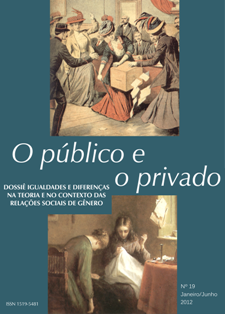Uma pesquisa sobre processos (pós) divórcio em Portugal
lei, género e práticas sociais
Palavras-chave:
Género, Família, Divórcio, Sistema judicial, Poder partenalResumo
A comunicação que se pretende apresentar tem por base alguns resultados preliminares do projecto “(Des)igualdades de género no trabalho e na vida privada: das leis às práticas sociais” (PTDC/SEDE/72257/2006), bem como do projecto de doutoramento de uma das autoras desta comunicação intitulado “Desigualdades de género: processos de ruptura conjugal e subsequente tutela das crianças” (SFRH/BD/41950/2007). Este projecto parte da hipótese global de que as formas de desigualdade e dominação de género, embora tributárias de mecanismos macro-económicos e institucionais, reproduzem-se também a nível micro (família, empresa, instituições públicas e privadas), implicando umas e outras diversas variáveis, designadamente a presença/ausência de determinado grau de poder de disposição (empowerment) sobre recursos e recompensas por parte dos actores sociais. Imbricando os conceitos de classe e género, numa combinação crítica das perspectivas (neo) marxista, weberiana, foucaultiana e interaccionista-simbólica mas tendo como pano teórico de fundo uma abordagem feminista pluridimensional, cruzam-se metodologias de ordem quantitativa e qualitativa no sentido de produzir novos conhecimentos empíricos e teórico-analíticos relativamente à administração da justiça nos processos de divórcio e regulação do poder paternal. Atendendo às tensões e estratégias que envolvem tais processos, esta comunicação incide na análise de estatísticas oficiais e sentenças judiciais recolhidas em Tribunais de Família e Menores em concelhos do distrito de Braga.











